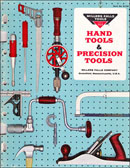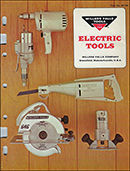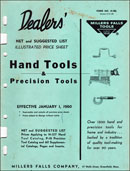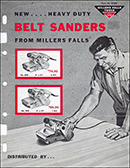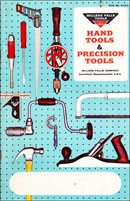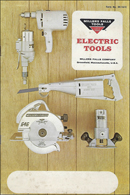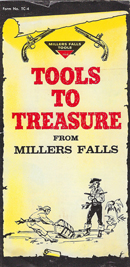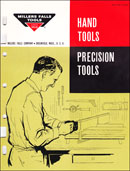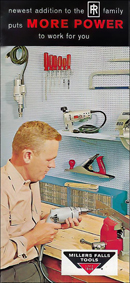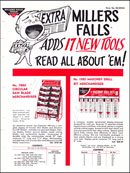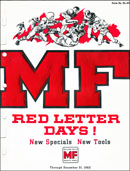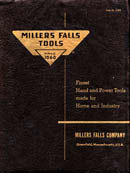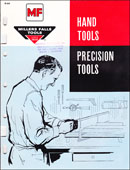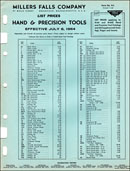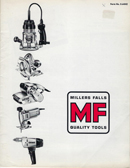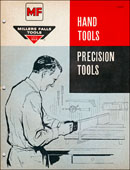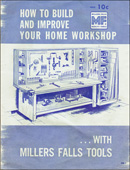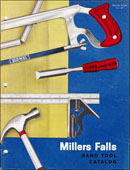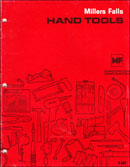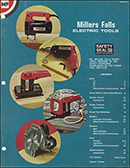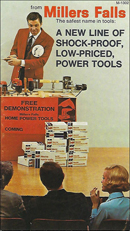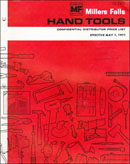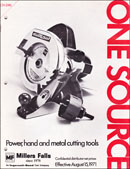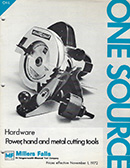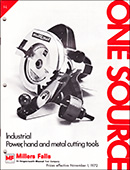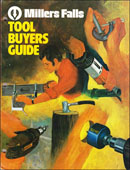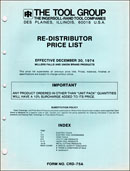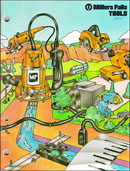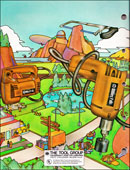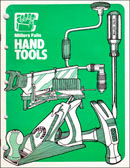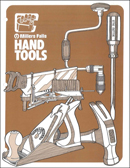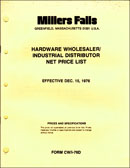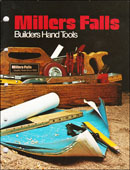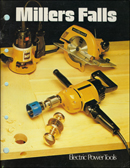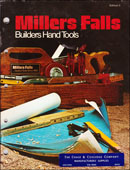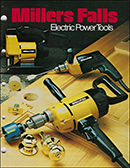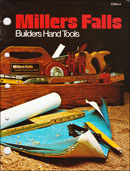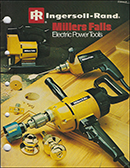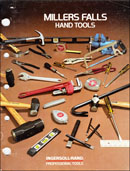Millers Falls Publications — 1960-1981
1960
- Millers Falls Company.
- Hand Tools & Precision Tools.
- Greenfield, Mass. : Millers Falls Co., [1960].
- "Form No. H-160."
- 75 pages ; 21.5 x 28 cm.
Large format catalog. Title from cover. Date is inferred from cover numbering, "H-160". Interesting in that it shows the company's line of precision measuring tools as well as hand tools.
- Millers Falls Company.
- Electric Tools.
- Greenfield, Mass. : Millers Falls Co., [1960].
- "Form No. DE-160."
- 66 pages ; 21.5 x 28 cm.
Title from cover. Includes attachments to convert selected hand drills into hedge trimmers, floor polishers, bench grinders, bench sanders, jig saws, sabre saws, finish sanders, circular saws, and portable planers.
- Millers Falls Company.
- Dealers' Net and Suggested List Illustrated Price Sheet: Hand Tools & Precision Tools, Effective January 1, 1960.
- Greenfield, Mass. : Millers Falls Co., Dec. 21, 1959.
- "Form No. H-3RL."
- 25 pages ; 21.5 x 28 cm.
Title from cover. Listed here although issued at the very end of 1959. Cover is uncoated paper, turquoise colored. Inside pages are coated paper with small illustrations.
Shown as an example of price lists produced at the time. Other dates and versions exist.
- Millers Falls Company.
- New ... Heavy Duty Belt Sanaders From Millers Falls.
- Greenfield, Mass. : Millers Falls Co., [1960].
- "Form No.D-2BS."
- 1 folded sheet ; 28 x 43 cm. (unfolded); 28 x 21.5 cm. (folded)
Title from cover. A trade circular printed on two sides and folded once. Introduces the No. 830 and No. 840 heavy duty belt sanders
- Millers Falls Company.
- Be a Mind Reader this Christmas, Give Millers Falls Tools.
- [Greenfield, Mass. : Millers Falls Co., 1960.]
- "Form No. 4-X60
- 1 folded sheet ; 10 x 65 cm. (unfolded); 10 x 18.5 cm. (folded)
Title from cover. A counter-top promotion, folded in thirds to form a small booklet. Presents a selection of hand and power tools a woman might wish to select for a man in her life. To the lower right, beneath the company trademarks is a blank space for a hardware dealer's stamp.
1961
- Millers Falls Company.
- Hand tools & Precision tools.
- Greenfield, Mass. : Millers Falls Co., [1961].
- "Form No. H-161C."
- 66 pages ; 15 x 23 cm.
Title from cover. Small format catalog. Date is inferred from cover numbering (H-161C) as number H-162C was published in 1962.
Beneath the illustration is a blank space for a hardware dealer's stamp.
- Millers Falls Company.
- Electric Tools.
- Greenfield, Mass. : Millers Falls Co., [1961].
- "Form No. DE-161C."
- 66 pages ; 15 x 23 cm.
Title from cover. Small format catalog. Includes attachments to convert selected hand drills into hedge trimmers, floor polishers, bench grinders, bench sanders, jig saws, sabre saws, finish sanders, circular saws, and portable planers.
Beneath the illustration is a blank space for a hardware dealer's stamp.
- Millers Falls Company.
- Tools to Treasure from Millers Falls.
- Greenfield, Mass. : Millers Falls Co., [1961].
- "Form No. TC-4."
- 1 folded sheet ; 16.5 x 24.5 (unfolded); 8.5 x 16 cm.5 (folded)
Title from cover. A counter-top promotion printed on both sides, folded twice times to form a booklet. Promotes a treasure hunt at participating hardware stores and obviously part of a larger sales campaign. Customers lucky enough to choose the right key to open a so-called treasure chest would receive the free Millers Falls tool housed inside. The inner panels of the brochure promote some of the company's most popular electric tools. The back panel promotes an assortment of hand-powered tools.
1962
- Millers Falls Company.
- Hand tools, Precision tools.
- Greenfield, Mass. : Millers Falls Co., copyright 1962.
- Large format: "Form No. H-162."
- Large format: 48 pages ; 21.5 x 28 cm.
- Small format: "Form No. H-162C."
- Small format: 48 pages ; 15 x 23 cm.
Title from cover. Content of large and small format catalogs is identical. Twenty pages shorter than its predecessor.
- Ingersoll-Rand Company.
- Newest Addition to the Ingersoll-Rand Family Puts More Power to Work For you
- Greenfield, Mass. : Ingersoll-Rand Co., copyright 1962.
- "Form 243."
- 1 folded sheet ; 47.5 x 18 cm. (unfolded); 8 x 18 cm. (folded)
- Small format: "Form No. H-162C."
- Small format: 48 pages ; 15 x 23 cm.
Title from cover. A counter-top promotion printed on both sides, folded five times to form a booklet. From 1962 through 1973, the parent company Ingersoll-Rand expected the Millers Falls Company to promote its own products. This brochure, introducing its new acquisition to Ingersoll-Rand Customers, is one of the few exceptions. Ingersoll-Rand began taking a greater role in the promotion of its subsidiary in 1974, it had little understanding of the consumer hand tool market and never promoted the line aggressively.
Copyrighted by Ingersoll-Rand, rather than Millers Falls.
1963
- Millers Falls Company.
- Extra, Millers Falls Adds 17 New Tools: Read All About 'Em.
- Greenfield, Mass. : Millers Falls Co., copyright 1963.
- "Form No. HE-2NT63."
- 4 pages [unnumbered] ; 21.5 x 28 cm.
Title from cover. A trade circular that introduces, among others, six new hatchets, a new series of tenite-handled screwdrivers and the no. 3040 chisel set.
- Millers Falls Company.
- MF Red Letter Days! New Specials, New Tools.
- Greenfield, Mass. : Millers Falls Co., copyright 1963.
- "Form No. RL-63."
- 8 pages [unnumbered] ; 21.5 x 28 cm.
Title from cover. A football-themed trade circular that introduces five new electric tools and eight new hand tools including a Dyna-Grip screwdriver set, shears, crosscut saws, snips, hex wrench sets and a checked-face framing hammer. Also features promotional prices on a number of other items in the line.
- Millers Falls Company.
- The Finest Hand and Power Tools Made For Home and Industry.
- Greenfield, Mass. : Millers Falls Co., [assembled 1963].
- "Form No. G-984."
- various pagings ; 24 x 29 cm.
Shown here is a distributor's pack either made up by or for S. L. McKenzie, jr., of the Dallas district office. His business card is clipped inside and bears the handwritten notation "8/20/63". The soft black cover contains current catalogs, distributor price lists and promotional items which have been pre-punched for use in a five-ring binder. Some of the contents of the binder pertaining to hand tools have been included as individual items on this list.
1964
- Millers Falls Company.
- Hand Tools, Precision Tools.
- Greenfield, Mass. : Millers Falls Co., copyright 1964.
- "H64."
- 48 pages ; 21.5 x 28 cm.
Title from cover. Both the traditional triangular and the new square trademarks can be seen on the cover. Gentleman on cover bears a striking resemblance to Ward Cleaver, the father figure on the Leave it to Beaver television series that ran until 1963.
- Millers Falls Company.
- List Prices: Hand & Precision Tools, Effective July 6, 1964.
- Greenfield, Mass. : Millers Falls Co., copyright 1964.
- "Form No. H-L."
- 8 pages; 21.5 x 28 cm.
Title from cover. Contains "List prices applying to: H64-Z Hand and precision tool catalogs and all supplemental catalogs, pages and inserts." Uncoated blue paper.
Shown as an example of price lists produced at the time. Other dates and versions exist.
- Millers Falls Company.
- MF: Millers Falls Quality Tools.
- Greenfield, Mass. : Millers Falls Co., 1964.
- "E-64-HZ."
- 24 pages ; 21.5 x 28 cm.
Title from cover. Though not explicity stated, this is an electric tools catalog.
1965
- Millers Falls Company.
- Hand Tools, Precision Tools.
- Greenfield, Mass. : Millers Falls Co., copyright 1965.
- "H65Z."
- 53 pages ; 21.5 x 28 cm.
Title from cover. Except for the catalog number, the cover is identical to that of the 1964 catalog. The catalog includes seven pages of wrenches, sockets, and pliers not seen in the 1964 catalog. The new tools were likely manufactured by the Pendleton Tool Company, the other major hand tool manufacturer in the Ingersoll-Rand Company stable.
- Millers Falls Company.
- How to Build and Improve Your Home Workshop ... with Millers Falls Tools.
- Greenfield, Mass. : Millers Falls Co., copyright 1965.
- "HW-1"
- 11 pages ; 21.5 x 28 cm.
Title from cover. Contains plans for a simple bench, tool board, and supply cabinet. The company hired popular woodworking writer John G. Shea to develop plans for the pegboard-and-plywood projects and anticipated customers would be willing to pay ten cents for the information. Five of the eleven pages consist of ads for Millers Falls tools.
1967
- Millers Falls Company.
- Hand Tool Catalog.
- Greenfield, Mass. : Millers Falls Co., June 1, 1967.
- "Form No. H-Cat."
- 44 pages ; 21.5 x 28 cm.
Title from cover. The size and nice layout of the catalog obscure the fact that the product line is shrinking.
1969
- Millers Falls Company.
- Millers Falls Hand Tools.
- Greenfield, Mass. : Millers Falls Co., [1969].
- "H-CAT."
- 53 pages ; 21.5 x 28 cm.
Title from cover. A undated catalog, but assuredly 1969. Reflective of the changes taking place in the hardware trade at this time. Many smaller items are now sold carded—i.e., on shrink-wrapped cardboard, pre-punched for hanging on a pegboard hook. Introduces the No. 9140, 9775 and 9790 teflon-coated planes.
1970
- Millers Falls Company.
- Hand Tools.
- Greenfield, Mass. : Millers Falls Co., [1970].
- "EH-Cat. 70."
- 19 pages : illustrated ; 21.5 x 28 cm.
Title from cover. An undated catalog, but published 1970. Though not explicity stated, this is an electric tools catalog. Most items are targeted to the consumer hand tool market. Includes drills, a bench grinder, a hedge trimmer, routers, sanders, circular saws, jig and sabre saws, and soldering guns. May be the only Millers Falls catalog to include a vacuum cleaner (canister type).
- Millers Falls Company.
- Millers Falls, the Safest Name in Tools: a New Line of Shock-Proof, Low-Priced, Power Tools.
- Greenfield, Mass. : Millers Falls Co., [ca. 1970].
- "M 1302."
- 12 pages : illustrated ; 21.5 x 28 cm.
Title from cover. A undated catalog, but published in 1970. Promotes the company's consumer line of double-insulated Shock-Proof tools. Deaths from the careless use of electric hand tools were not unheard of. The Shock-Proof line protected users who thoughtlessly removed the cord’s grounding prong and protected against problems due to cord wear. Shock-Proof tools were safer than conventionally grounded tools if used in damp conditions.
1971
- Millers Falls Company.
- Hand Tools: Confidential Distributor Price List Effective May 1, 1971.
- Greenfield, Mass. : Millers Falls Co., 1971.
- "HOLDER."
- 35 pages ; 21.5 x 28 cm.
Title from cover. A combination price list and catalog covering a much-reduced line of Millers Falls hand tools. Once an industry leader in hand-powered boring tools, the company now offers 8 braces, 4 eggbeater drills, 2 push drills and a lone breast drill. Cover design is a rework of the previous catalog. At first glance, the cover is very similar to that of 1969, but it does, in fact, include a few line drawings not included on the 1969 cover.
- Millers Falls Company.
- One Source: Power, Hand and Metal Cutting Tools, Confidential Distributor Net Prices Effective August 15, 1971.
- Greenfield, Mass. : Millers Falls Co., 1971.
- "CH-DRL."
- 83 pages ; 21.5 x 28 cm.
Title from cover. Its hand tool section is, for the most part, a reprint of Hand Tools: Confidential Distributor Price List Effective May 1, 1971. Includes net, resale and list prices.
1972
- Millers Falls Company.
- One Source: Hardware: Power, Hand and Metal Cutting Tools, Confidential Distributor Net Prices Effective November 1, 1972.
- Greenfield, Mass. : Millers Falls Co., 1972.
- "CH-L."
- 63 pages ; 21.5 x 28 cm.
Title from cover. A catalog of the company's general line. Lists fewer saw blades and power tool accessories than the previous edition. The pages featuring hand tool merchandising displays no longer appear. An almost identical version of the catalog that does not include prices was also published—no date appears on its cover.
- Millers Falls Company.
- One Source: Industrial Power, Hand and Metal Cutting Tools, Prices Effective November 1, 1972.
- Greenfield, Mass. : Millers Falls Co., 1972.
- "I-L."
- 87 pages ; 21.5 x 28 cm.
Title from cover. A comprehensive catalog of the company's products, it includes industrial-grade tools.
1974
- Ingersoll-Rand. The Tool Group.
- Millers Falls Tool Buyers Guide.
- [S. l.] : The Tool Group, 1974
- "CHL-74."
- 106 pages ; 21.5 x 28 cm.
Title from cover. The Tool Group was the umbrella name for the Ingersoll-Rand hand tool companies—Union Tool, Proto, Challenger and Millers Falls. This buyer's guide is basically a Millers Falls catalog with fourteen pages of Union Tool precision tools appended. No prices.
- Ingersoll-Rand. The Tool Group.
- Re-distributor Price List Effective December 30, 1974: Millers Falls and Union brand Products.
- Des Plaines, Ill. : The Tool Group, 1974.
- "Form No. CRD-75A."
- 19 pages ; 21.5 x 28 cm.
Title from cover. Uncoated blue paper. Redistributor and list prices for Millers Falls hand tools and Union Tool precision tools for the 1975 year.
Shown as an example of price lists produced at the time. Other dates and versions exist.
1975
- Ingersoll-Rand. The Tool Group.
- Millers Falls Tools.
- [S. l.] : The Tool Group, [1975].
- 88 pages ; 21.5 x 28 cm.
Title from cover. Wonderful cover art makes this catalog a classic period piece. Inspired by the "hippie" style of the late 1960s and early 1970s, the front and rear covers depict such fantasies as a hacksaw cutting the top off a mountain, a tape measure that turns into a driveway, a router cutting a canal, and a combination-square bridge. The illustration is simply signed "Fisher" and attempts at further identifying the artist have come to naught. Former company president Jim Mitchell remembers staff in the Millers Falls office referring to the publication as the "Mickey Mouse catalog."
1976
- Ingersoll-Rand. Millers Falls Division
- Millers Falls Hand Tools.
- Greenfield, MA : Millers Falls Division, [June 1976].
- 33 pages ; 21.5 x 28 cm.
Title from cover. Ingersoll-Rand abandoned the Tool Group concept in 1976. The Millers Company is now referred to as the Millers Falls Division of the Ingersoll-Rand Company. Amazingly, at this late date, the catalog still includes listings for three miter boxes. Jim Mitchell, company president at the time, recalls that the operation's miter boxes were among the most profitable of its hand-powered tools.
- Ingersoll-Rand. Millers Falls Division
- Millers Falls Hand Tools.
- Greenfield, MA : Millers Falls Division, [late 1976].
- pages 49-76, [i.e. 27 pages] ; 21.5 x 28 cm.
Title from cover. A version of the Millers Falls Division's 1976 hand tool catalog issued near the end of the year. Reflects minor changes in the line that have occurred since the June catalog.
- Ingersoll-Rand. Millers Falls Division.
- Hardware Wholesaler/Industrial Distributor Net Price List, Effective Dec. 15, 1976.
- Greenfield, Mass. : Millers Falls Division, 1976.
- "Form CW/I-76D."
- 22 pages ; 21.5 x 28 cm.
Title from cover. Uncoated yellow paper. Wholesaler/industrial distributor net, resale and user prices for Millers Falls tools.
Shown as an example of price lists produced at the time. Other dates and versions exist.
1977
- Ingersoll-Rand. Millers Falls Division.
- Millers Falls Builders Hand Tools.
- Greenfield, Mass. : Ingersoll-Rand, Millers Falls Division, [1977].
- 39 pages ; 21.5 x 28 cm.
Title from cover. No electrical tools are included. This is the first of several catalogs that have virtually identical covers. Interestingly, the catalog includes a new hand drill, the No. 506121.
- Ingersoll-Rand. Millers Falls Division.
- Millers Falls Builders Hand Tools.
- Greenfield, Mass. : Ingersoll-Rand, Millers Falls Division, [1977].
- 43 pages ; 21.5 x 28 cm.
Title from cover. An easily missed variant. Title from cover. Contains 43 numbered pages, rather than thirty-nine. No electrical tools are included.
- Ingersoll-Rand. Millers Falls Division.
- Millers Falls Electric Power Tools.
- Greenfield, Mass. : Ingersoll-Rand, Millers Falls Division, [1977].
- 44 pages ; 21.5 x 28 cm.
Title from cover. Includes hand drills, hammer drills, screwdrivers, circular saws, sabre saws, sanders, grinders, routers, metal shears, a portable bandsaw, and a soldering iron.
1978
- Ingersoll-Rand. Millers Falls Division.
- Millers Falls Builders Hand Tools.
- Greenfield, Mass. : Ingersoll-Rand, Millers Falls Division, [1978].
- Edition 3.
- "Form #45006."
- 44 pages ; 21.5 x 28 cm.
Title from cover. An easily missed variant. Title from cover. At first glance appears identical to its predecessor but can identified by the notation 'Edition 3' on the right hand corner of the cover. By this time, most of the Millers Falls line of hand-powered tools were manufactured elsewhere and branded with the company name.
- Ingersoll-Rand. Millers Falls Division.
- Millers Falls Electric Power Tools.
- Greenfield, Mass. : Ingersoll-Rand, Millers Falls Division, [1978].
- "Form #45000."
- 52 pages ; 21.5 x 28 cm.
Title from cover. Includes hand drills, hammer drills, screwdrivers, circular saws, sabre saws, sanders, grinders, routers, metal shears, a portable bandsaw, and a soldering iron.
1979
- Ingersoll-Rand. Millers Falls Division.
- Millers Falls Builders Hand Tools.
- South Deerfield, Mass. : Ingersoll-Rand, Millers Falls Division, [1979].
- Edition 4.
- "Form no. BHT-79."
- 32 pages ; 21.5 x 28 cm.
Title from cover. An easily missed variant. Title from cover. At first glance appears identical to is predecessor. It contains 12 fewer pages, however, and can be identified by the notation 'Edition 4' on the right hand corner of the cover. A number of tools have been eliminated; few tools are identified as 'new'. Notable among these is a new bit brace, the No. 1910 (no relationship to the company's earlier 1910 M-S). Published after company headquarters were moved from Greenfield to South Deerfield, the catalog was the last produced during company president Jim Mitchell's tenure.
1980
- Ingersoll-Rand. Millers Falls Division.
- Ingersoll-Rand: Millers Falls Electric Power Tools.
- South Deerfield, Mass. : Ingersoll-Rand, Millers Falls Division, [1980].
- Edition 6.
- "Form #MFETC-80."
- 44 pages ; 21.5 x 28 cm.
Title from cover. An easily missed variant. Includes hand drills, hammer drills, rotary hammers, screwdrivers, reciprocating saws, circular saws, sabre saws, sanders, grinders, routers, metal shears, a portable bandsaw, and a soldering iron.
1981
- Ingersoll-Rand.
- Millers Falls Hand Tools.
- Des Plaines, Ill. : Ingersoll-Rand National Sales Office, 1981.
- First ed.
- "Form 50670."
- 34 pages ; 21.5 x 28 cm.
Title from cover. By this time, the much reduced Millers Falls line of hand tools included 2 miter boxes, a hand drill, a breast drill, six braces, and six hand planes. Interestingly, a version of the so-called Buck Rogers hacksaw was still in production. The venerable No. 2 hand drill, renumbered the No. 2-01, is still offered (over a century after its introduction). Two block planes dating to the time of the company's introduction of hand planes in 1929 remained available—a much-altered No. 56 and the No. 75 (renumbered 75-01).
